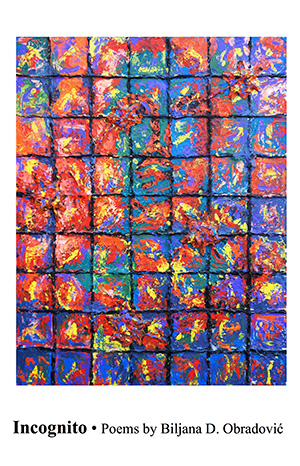Casting the Wanderer’s Eye in Biljana Obradović’s Incognito

Biljana Obradović captures the immigrant’s distrust of the permanent in Incognito.
Serbian American poet Biljana Obradović has lived in Yugoslavia, Greece, India, and in the US, where she is now a professor at Xavier University in New Orleans. In Incognito (WordTech, 2017), her fourth collection, she travels the world and poetically reports on its diversity and the value of understanding others. Among these fifty-three poems are tableaux and vignettes from Belgrade, New Orleans, Venice, Padua, Cleveland, Kosovo, China, and Nebraska, among many other locales.
The poems are accessible, written in a plain, conversational style. Obradović helps readers keep their bearings, starting many of the poems with helpful settings of context: “The Festival of Politeness,” for example, begins “At the Fiesta Latina on Sunday at Pack Square / in Asheville we went around the different booths / picking up free stickers, snacks, pens, while a Latin group played.” “How Does Dante’s Love Fare Today?” is similarly accommodating: “Dante’s love story with Beatrice / lured me to his house in Florence / from which he was exiled for life.” Occasionally the conversational style borders on the factual, as in the first lines of “Incognito: Twisted Art”: “In Brunnenburg Castle, in the small town of Dorf Tirol / near Merano in northern Italy, where German is spoken / a Tempo Reale art exhibition is opened, a set of sculptures / oil paintings of an avant-garde Italian artist from Bolzano.” Such discourses are brief, however, serving to situate the personal, not replace it. The poem ends with these lines: “I know I have not persuaded him. I know / that he just wants proof that she was here, not some anonymous poet.”
The collection is about movement, taking us not only from Lincoln to Qufu but also from “Weird Scenes” to “Mothers,” “Amore,” “Italy,” “China,” “Serbian Blues,” and “Death” (the seven part titles). More importantly, the poems move forward. Some move toward resolution, closure, and amelioration. In “Stop These Dreams,” a wistful parental love emerges from memories of conflict: “I, too, could not hate, but love the abuser.” Beginning with dread of an approaching summer storm, “Peace and Joy” ends with “it’ll be his mother—me, / to breastfeed him before the coming storm, The rainbow in the end . . .” Others move into impatience, sadness, or indignation. In “At the Supermarket,” two friends respond to a stranger’s exhortation to “speak American” by telling her that “. . . we could speak six languages between us, at least / five more than her.” In “Eye to Eye,” a Serbian actor who starred in “old partisan movies” is spotted on a bus, triggering first sympathy and then sorrow: “. . . he’s not what he once was. / None of us are what we once were.”
For readers of Incognito, as for Obradović herself, nations come and go, citizenship waxes and wanes, and loved ones emerge or recede.
In “Losing a Star from the Flag of Yugoslavia,” Obradović informs us that when she was a child, “Everything seemed possible” but “the country fell apart.” In “The Festival of Politeness,” she writes of trying to become an American citizen, only to be delayed by Katrina (which also interrupted her son’s toilet training). For readers of Incognito, as for Obradović herself, nations come and go, citizenship waxes and wanes, and loved ones emerge or recede. With this collection, Biljana Obradović suggests that to leave home is to become an immigrant, and to be an immigrant is to be in motion.
Baton Rouge, Louisiana










